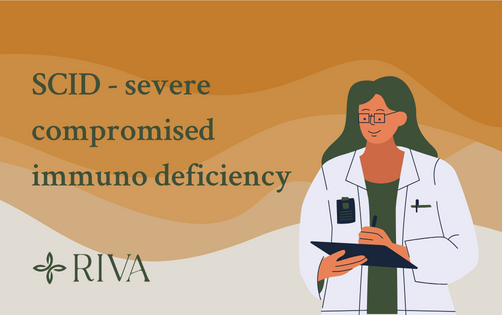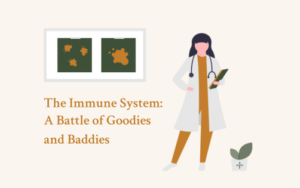What is severe combined immunodeficiency (SCID)
Severe combined immunodeficiency (SCID) is a rare and serious genetic disorder that affects the immune system. Babies with SCID are born with little to no ability to fight infection, making them highly vulnerable to life-threatening illnesses. It is characterised by a deficiency in both T-cells and B-cells, which are the two main types of immune cells responsible for fighting infections.
What happens in Severe Compromised Immunodeficiency?
In a developing baby, the immune system starts in the bone marrow. Stem cells there can become any of 3 types of blood cells:
- Red blood cells
- Platelets
- White blood cells
White blood cells protect the body from infections and foreign invaders. There are different kinds of white blood cells, including lymphocytes. There are 2 main types of lymphocytes: B-cells, and T-cells. These cells are key to fighting infections:
- T cells identify, attack and kill ‘invaders.’
- B cells make antibodies that ‘remember’ an infection and are primed if the body is exposed to it again.
SCID is a “combined’ immunodeficiency as it affects both of these important infection-fighting cells. A child with SCID will have too few properly functioning lymphocytes, and therefore will be highly susceptible to life-threatening infections and illnesses.
What causes Severe Combined Immunodeficiency?
SCID is an inherited condition, caused by mutations in one of several genes responsible for the proper development and function of immune cells. There are currently 13 different genes, that when mutated, cause SCID. The 2 most common types are X-linked SCID, which primarily affects male infants and is caused by a genetic mutation on the X chromosome and ADA deficiency type.
Although the treatment and management of infants with SCID is usually similar for all types, it is important to know the exact cause, as specific treatments may be available.
What are the signs and symptoms of SCID?
Symptoms of SCID usually start within the first year of a child’s life. Babies with SCID may appear well at birth and for the first few weeks of life, as they are somewhat protected by antibodies acquired from the mother via the placenta in the first few months of pregnancy.
The symptoms of severe combined immunodeficiency can vary depending on the underlying cause and vary from child to child, but may include:
- -Recurrent infections: frequent and severe infections such as pneumonia, meningitis, and sepsis.
- -Chronic diarrhoea: persistent diarrhoea, which can lead to malnutrition and dehydration.
- -Repeated ear infections.
- -Slow growth and developmental delays in children.
- -Chronic inflammation and skin rashes: recurrent skin rashes, recurrent thrush, hives, and other forms of skin inflammation.
- -Difficulty fighting off infections: slow or inadequate response to antibiotics and other treatments for infections.
It’s important to note that some symptoms of SCID can be mistaken for other health conditions, so it’s crucial to seek a medical evaluation for proper diagnosis and treatment.
Germs in the environment that are not a problem for healthy individuals can cause serious and life-threatening diseases for children with SCID. Common childhood illnesses, such as chickenpox (varicella) and the cold sore virus (herpes simplex) can also be dangerous and life-threatening for a child with SCID.
How is SCID diagnosed and treated?
Recurrent infections resulting in serious deterioration in a child’s condition may be the first sign of a serious problem. Routine investigations, usually showing a low lymphocyte count in the blood, could be indicative of SCID.
Early diagnosis and treatment can greatly improve a child’s prognosis. Since 2021, the NHS has been running an evaluation of screening for SCID in certain areas in England, as part of the newborn screening at 5 days old. The results of this evaluation will determine whether screening for SCID will become part of the NHS newborn blood spot screening practice.
SCID is a paediatric emergency and without treatment, babies are unlikely to survive past their first birthday. Treatment options include stem cell (bone marrow) transplantation, gene therapy, and enzyme replacement therapy.
The most common treatment is a stem cell (bone marrow transplant), as this offers a long-term cure for SCID. The aim is to replace the child’s faulty immune system, with a healthy one from a suitable donor, using stem cells. The stem cells in the donor bone marrow, given by transfusion, are able to find their way from the bloodstream to the child’s bone marrow, where they can start to produce healthy blood cells. The most successful stem cell transplants use cells donated by a sibling.
Gene therapy aims to correct the underlying genetic abnormality by replacing the faulty gene in immune cells with the correct copy. Gene therapy is currently undergoing clinical trials but is showing promising results in curing SCID.
It is important for individuals with SCID to take precautions to prevent infections, such as avoiding close contact with sick people, regularly washing their hands, and avoiding exposure to certain environmental toxins. In addition, those with SCID should receive regular check-ups and follow-up care from a healthcare professional experienced in treating immunodeficiencies.
Can vaccinations be given to children with SCID?
Individuals with SCID are at high risk for serious infections and cannot mount an adequate immune response to vaccines. In some cases, vaccines can actually cause severe harm to people with SCID. For this reason, individuals with SCID should not receive live attenuated vaccines, such as the rotavirus, chickenpox (varicella), oral polio, BCG and the MMR (Measles, Mumps, Rubella) vaccines and should only receive inactivated or recombinant vaccines with caution and under the supervision of a specialist. Anyone living in the same household as a child with SCID should also not receive any live vaccines.
In 2021, changes were made to the current guidance for the infant vaccination programme. These include changes to the BCG vaccination schedule. The BCG vaccination will now be offered to eligible babies at 28 days or soon after. This now allows for a SCID screening result to be available. Providers will be required to check the child’s record for a negative SCID result or confirmation that the child was not offered SCID screening, before administering the BCG vaccine. SCID screening status will also need to be checked before the rotavirus vaccine is offered at the 8-week vaccination appointment.
What does the future hold for children diagnosed with SCID?
There is still much to be learned about SCID, but advances in medical technology and research have improved the prognosis for those affected by this disorder. With early diagnosis and treatment, many individuals with SCID are able to lead healthy and fulfilling lives.
About RIVA
RIVA understands that a career in healthcare can be incredibly rewarding and offers a variety of opportunities for personal and professional growth. We understand the pressures of working in an industry that’s always changing. That is why all of our courses are taught by specialists in their field, who maintain senior positions in the healthcare sector. This ensures that you receive the most up-to-date immunisation training for nurses and healthcare support workers possible, empowering you to administer vaccinations and answer questions from the public with confidence. Please get in touch if you are interested in any of our upcoming courses.





